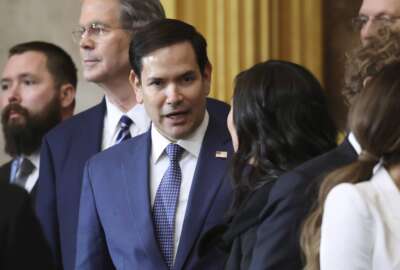Senators’ USPS plan cuts staff, refunds FERS overpayments
Senators announced a bipartisan plan Wednesday to help keep the financially ailing Postal Service solvent while offering incentives to trim its workforce.
wfedstaff | June 4, 2015 1:30 pm
Senators announced a bipartisan plan Wednesday to help keep the financially ailing Postal Service solvent while offering incentives to trim its workforce.
The proposal would lift the agency “from the brink of bankruptcy,” said Sen. Joe Lieberman (I-Conn.), chairman of the Homeland and Governmental Affairs Committee.
He said the committee next week would take up the proposal, which also would continue six-day mail delivery for at least two more years, overhaul workers’ compensation eligibility rules and allow the Postal Service to negotiate a new health insurance plan with its unions.
The Postal Service lost $8 billion last year and could report even larger losses when its 2011 budget year report comes out in mid-November.
“We’re not crying wolf here” about the agency, said Sen. Susan Collins (R-Maine), the committee’s ranking member. If nothing is done, she said, the Postal Service would not be able to pay its workers by next summer.
The new proposal would instruct the government to refund the Postal Service nearly $7 billion it has overpaid into the Federal Employee Retirement System.
“This is money that they were owed. It is not a bailout,” said Lieberman.
The legislation would require the Postal Service to use part of the refund for buyouts aimed at reducing staff by 100,000. The agency could use the rest of the money as it saw fit. The senators said they expected it would pay down some of the $15 billion it has borrowed from the Treasury.
In addition, the agency could spread out its $5.5 billion annual payments for future retiree health benefits. The proposal doesn’t offer USPS other money, even though the agency and its unions had called for a return of more than $50 billion that USPS claimed it had overpaid into retiree benefit programs.
The Government Accountability Office has challenged the agency’s assertion that that money was an overpayment.
Lieberman said refunding the money would have been “a temporary palliative.”
“It would’ve concealed their problems,” he said. “What we’ve done in this bill is to require them, encourage them and enable them with new authorities to make the fundamental changes that the Postal Service has to make to survive in the 21st century.”
The bill gives the postmaster general authority to negotiate with unions on a possible alternate health care system that would cost less.
Mail delivery would have to continue at six-days-a-week for at least two years. After that, if the Postal Service wanted to reduce deliveries to five days, the independent Postal Regulatory Commission would have to verify that other cuts have been made and the savings still were not enough to ensure financial viability.
The National Association of Letter Carriers says that would drive away business and “seems to embrace the Postmaster General’s view that we must drastically downsize the Postal Service in order to save it.”
The bill would also overhaul the workers’ compensation program across the government. Currently the Postal Service has 2,000 workers over age 70 receiving workers’ compensation. Switching them to retirement programs could save money.
Sens. Tom Carper (D-Del.) and Scott Brown (R-Mass.) joined in the announcement. Carper said the bipartisan plan would give Congress an opportunity to prove that it could still lead.
He said the philosophy behind the bill borrowed from Home Depot’s slogan, “You can do it. We can help.” “We are choosing not to be a board of directors and to get out of the way,” he said.
On the other side of the Capitol, the House Oversight and Government Reform Committee has approved a bill, sponsored by chairman Darrell Issa (R-Calif.), to create a commission that would decide how to trim the Postal Service’s network of post offices, processing centers and delivery routes. It would also give a control board nearly all authority over the Postal Services’ finances if the agency was more than 30 days late in paying its bills.
“Chairman Issa applauds the Senators’ recognition that the Postal Service requires a fundamental restructuring and not a taxpayer funded bailout. We look forward to reviewing their legislation once it is introduced and continuing discussions to find a bipartisan and bicameral approach to reforming and protecting the long-term viability of the Postal Service,” said committee spokesman Ali Ahmad.
Sen. John McCain (R-Ariz.) has introduced similar legislation. A spokesman said McCain would work with the Senate committee to incorporate provisions of his bill in their legislation.
Those proposals are “simply punitive and unfair to those dedicated federal employees who suffered a catastrophic injury that prevents them from ever working again,” said the National Treasury Employees Union president Colleen Kelley in a written statement.
“Without taking controversial steps like these, the Postal Service is simply not going to make it, and that would be terrible,” Lieberman said.
The Postal Service said it would review the bill’s provisions, while continuing to take “aggressive actions under our control to cut costs and increase revenue to return to profitability,” according to a written statement.
Mail volume is down 22 percent since 2007, largely because of the combination of people switching to the Internet to communicate and pay bills. The recession has discouraged advertising mail.
Art Sackler of the trade group Coalition for a 21st Century Postal Service said the Senate plan was “smart and balanced,” while Tony Conway of the Alliance of Nonprofit Mailers believes it would “provide needed relief for the Postal Service and ensure the continuation of critically important mail delivery.”
Reed Anfinson, president of the National Newspaper Association and publisher of the Swift County, Minn., Monitor News, said the measure “takes a critical step toward a stable Postal Service.”
The Associated Press contributed to this story
RELATED STORIES:
GAO: Postal Service did not overpay CSRS account
Postal Service warns Senate of dire finances
Copyright © 2025 Federal News Network. All rights reserved. This website is not intended for users located within the European Economic Area.





